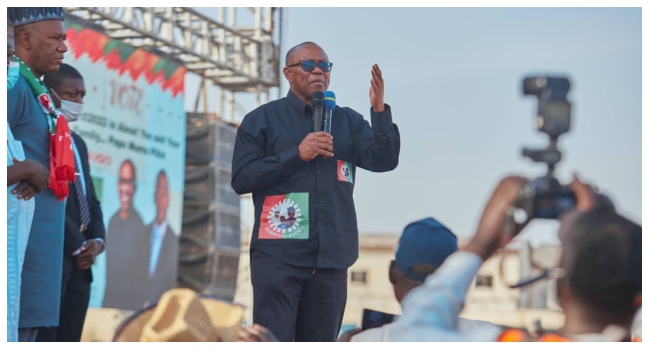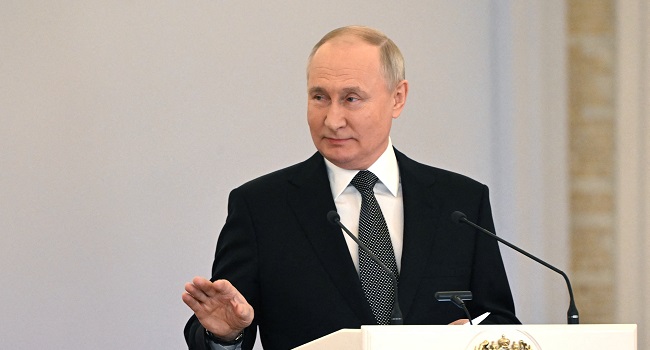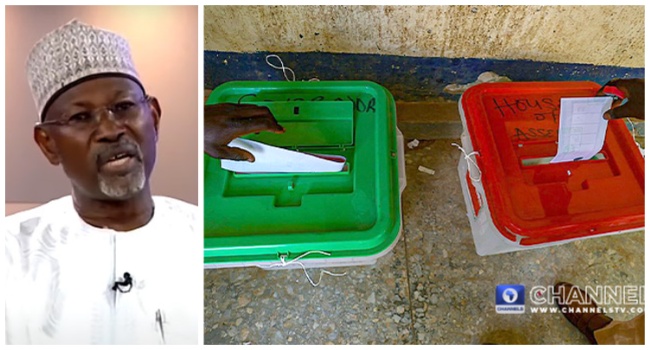At 61, former governor Peter Obi is the youngest of the three frontrunners for Nigeria’s top job in this weekend’s presidential election.
With a message that he is the only candidate offering real change, Obi, a wealthy businessman from southeast Nigeria’s Anambra state, has emerged as an unexpectedly powerful force in the race.
He challenges ex-Lagos governor Bola Ahmed Tinubu, 70, of the ruling All Progressives Congress (APC) and 76-year-old ex-vice president Atiku Abubakar of the main opposition Peoples Democratic Party (PDP).
The two old warhorses — Tinubu and Abubakar — have dominated the Nigerian political landscape since the return of democracy in 1999.
Tinubu, a Muslim from southwest Nigeria, has been a senator, two-term governor of Lagos and long-professed political kingmaker.
Abubakar, a northern Muslim, was vice president between 1999 and 2007 and is on his sixth attempt at the presidency.
For supporters of Obi, a 61-year-old Christian from the Igbo-speaking region and candidate of the Labour Party, his background is the starting point for what sets him apart.
With a reputation for frugality and integrity, Obi’s tenure as Anambra state governor is a reference point for his accountability in public service.
His supporters see that as a departure from endemic corruption that has marred the nation’s public life, endearing him to younger Nigerians who represent a large portion of registered voters.
Obi’s growing popularity and social media appeal are unprecedented in modern Nigeria where PDP and APC have dominated politics since the end of military rule in 1999.

For the first time, Obi is rallying the younger electorate — mostly in their 30s — into a popular movement nicknamed ‘Obidients’, despite the Labour Party’s lack of a national structure.
He joined the Labour Party last year after failing as vice presidential candidate for the PDP in 2019.
Obi and his supporters believe old-school politicians should step aside and this election is the opportunity for Nigerians to vote them out.
“It’s time to take your country back,” Obi often says at campaign rallies.
Analysts see Saturday’s ballot as a three-horse race among Tinubu, Abubakar and Obi.
“We need a change and with Obi we will get that change,” said food seller Lorita Unegbu, attending an Obi rally at a Lagos stadium last week.
Some opinion polls forecast an Obi victory but critics say his popularity is only on social media and among young Nigerians, many of who don’t have voter cards.
They argue that the former governor and his party lack the geographical spread and political structure to win the vote, especially in the mostly Muslim north.
Under Nigerian electoral law, a candidate must win the most votes along with at least 25 percent of votes in 24 of Nigeria’s 36 states and in the federal capital, Abuja.
Nasir El-Rufai, ruling party governor of northern Kaduna state, said Obi’s momentum on social media “cannot translate” into votes for him to win the election.
Obi has also been accused of failing to declare offshore accounts and assets as well as investing state funds into a family company — charges he dismisses.
His opponents also point to the activities of the outlawed Indigenous People of Biafra (IPOB) separatist group seeking an independent homeland for ethnic Igbo people of southeast Nigeria.
IPOB has been accused of attacking election offices and police, and critics say Obi has not done enough to condemn the group.
Despite the misgivings, Obi and his running-mate Yusuf Datti Baba-Ahmed, a northern Muslim, have had strong showings at campaign rallies, even in the north.
Even in Tinubu’s southwest stronghold, Obi has attracted large crowds, drawing support from the large population of Igbo traders and residents, especially in Lagos.
Former president Olusegun Obasanjo and his fellow Yoruba leader Ayo Adebanjo, have publicly endorsed Obi’s bid, insisting it is the turn of the Igbo to get the presidency since other regions have had their chance at the top job.




